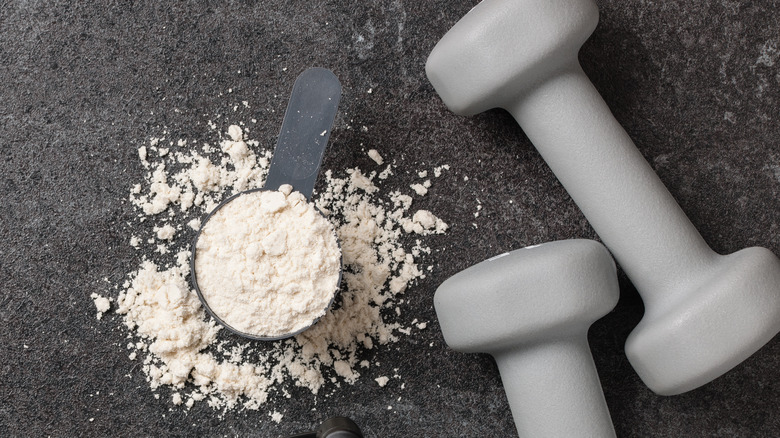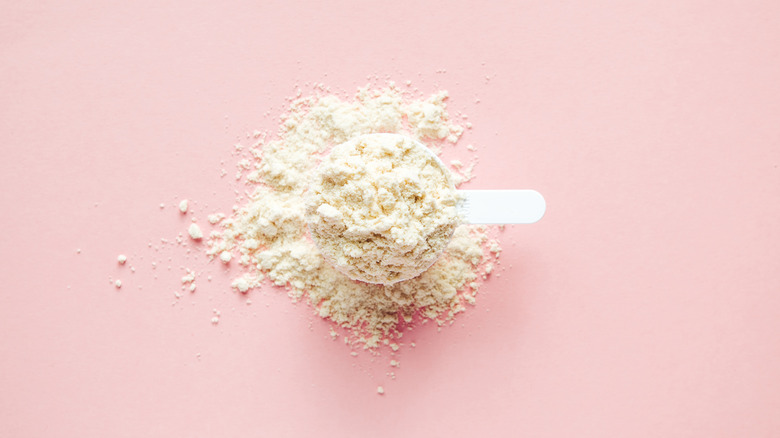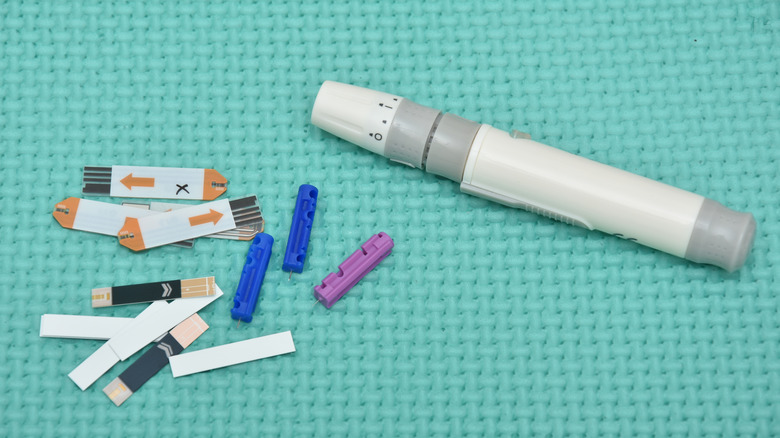What Happens To Your Body When You Start Taking Whey Protein
In gyms across the land, there lives a powder beloved by bodybuilders and casual exercisers alike: That's right, we're talking about that oversized tub of whey protein, which folks consume by the scoopful in the pursuit of peak physical health. Derived from the whey part of milk, whey protein is a common supplement for people looking to boost their protein levels (per WebMD). Once a niche product only used by those in the know in the fitness industry, these days the whey protein market is unstoppable, with its size estimated to grow by almost ten percent every year until 2027, according to Grand View Research. That's a lot of protein.
But as with any relatively new food product on the market, there's a natural curiosity about what consuming whey protein actually does. And although whey protein in its purest form is a natural product, some people may well be wondering what's happening with all of those powders and supplements once they make their way to your belly. So, we decided to take a look. Come and get the scoop (Get it? Yeah? Okay, glad we're on the same page) on all things whey protein in this article.
Taking whey protein may help keep inflammation down
Whey protein is most commonly associated with bulging biceps and iron-strength quads, but as it turns out, it may have way more effects than just increasing muscular strength. One interesting effect of taking whey protein is its potential reduction of inflammation throughout the body, according to research published in Nutrients.
The meta-analysis looked at the impact of whey protein supplementation on C-reactive protein (or CRP) levels in participants' bodies. Created in the liver, CRP levels are raised in response to inflammation in the body — and while a CRP test is used to establish several risk factors for chronic diseases, it primarily assesses inflammation levels (per WebMD). Researchers found that taking whey protein does seem to reduce CRP levels throughout the body — but only in certain circumstances, including when people already had a higher level of CRP circulating, or when they were supplementing at especially high doses. For folks taking the odd scoop of protein, however, results may not be as impactful.
Whey protein could make you gassier
Ever had a scoop of whey protein and then suddenly felt a little, well, gusty? You're not alone, friends. One unfortunate side effect of taking whey protein could be its increase in gas production, resulting in more flatulence and bloating, according to Men's Health. It should be established straight off the bat that this isn't due to the protein levels of the supplement, says gastroenterologist Sameer Islam. As he said to Men's Health, "The type of protein you are ingesting (like protein from meats or the ingredients from shakes) plays a more significant role in gas."
In the case of whey protein, increased gas production will likely come from sugars added to the blend. Fructose, xylitol, and mannitol — all common additives in protein powders and shakes — can stimulate gut action and gas, leaving you with some unpleasant symptoms and, in certain cases, diarrhea. Bear in mind that a little gas may not be a sign of a gastrointestinal problem — after all, everyone has to fart now and again. But if you're noticing substantial gut symptoms after taking whey protein, you might want to reconsider your consumption levels or try a different protein altogether.
Your metabolism might get faster if you're taking whey protein
Because it determines how quickly we turn what we eat and drink into usable energy, when our metabolism is faster, we burn through energy with greater hast, as the Cleveland Clinic states. And if you consume whey protein, you might find that your metabolism speeds up slightly, potentially due to the higher protein levels your body's dealing with. According to research published in The Journal of the American College of Nutrition, eating a high-protein and low-fat diet makes a huge difference to the metabolism in comparison to a high-carb, low-fat diet, with the high-protein diets raising the metabolic rate by 100%. This would suggest that the more protein you eat in place of other food sources, the more your body has to work to get through it all.
And for people looking to boost their metabolism around the clock, you may be in luck with whey protein. A further study, this one published in The American Journal of Clinical Nutrition, found that the boost in metabolic rate from increased protein consumption can extend to your sleeping hours too. Who said snoozing can't be useful?
Taking whey protein will help you get stronger
So this one may come as no surprise, considering how popular whey protein is with those jacked dudes you see at the gym every day, but we can report that yes, it's true: Whey protein can help you get stronger. Give us our Pulitzer now!
The main reason, of course, is because of whey protein's ... levels of protein. Proteins are, essentially, the Lego pieces of your body: They work to build muscle, bones, and everything in between, as Healthline points out. But whey protein isn't just any old protein. With an incredible amino acid profile, it's particularly designed to be effective for building muscular strength. Of the essential amino acids present in whey protein, several known as branched-chain amino acids (or BCAAs) are especially adept at stimulating muscular growth, with one BCAA — leucine — serving to stimulate protein synthesis, according to research published in The Journal of Nutrition. Whey protein is also absorbed more quickly than other proteins, meaning it gets to your muscles faster. And, if that wasn't enough, taking whey protein may also serve to stimulate certain anabolic hormones, including insulin, that might help you get stronger faster, per research published in Nutrition & Metabolism. Reckon that's enough reasons for you to give it a go?
Regular whey protein may help you to reduce your blood pressure
Doing what we can to control our blood pressure is vital to keeping a range of chronic health conditions at bay, including stroke, heart disease, and metabolic syndrome (per the Mayo Clinic). And by taking whey protein, you might find that it helps out on the blood pressure front. This might well be down to the types of angiotensin-I-converting enzyme inhibitors, or ACE inhibitors for us mere mortals, present in whey proteins, as research published in Nahrung discusses.
One such ACE inhibitor in the protein, known as alpha-lactorphin, has been observed to lower blood pressure when consumed by rats, as a study published in Life Sciences shows. A more focused study found in Obesity (Silver Spring) that looked at whey protein specifically also found that consuming it reduced blood pressure amongst participants. This study, however, was a smaller-scale one, and whey protein's effects on blood pressure likely need further research before its impact can be conclusively stated.
You can end up loading your body with sugar by drinking whey protein
Whey protein is famed for its protein content (the clue's in the name, folks). But it's not just protein you might be getting in that shake of yours. To give them a tasty flavor, protein powders often come with sugar added to them, as Harvard Health Publishing states. But the levels of sugar in some of these products can be pretty wild: Some protein brands will have as much as 23 grams of sugar per scoop serving. When you consider the fact that the American Heart Association recommends that women only consume 25 grams daily, that's almost your entire lot in one go.
These sugars naturally have a bearing on both your blood sugar — spiking it suddenly — and the number of calories you take in. Some protein drinks may have as many as 1,200 calories per serving, Harvard Health Publishing says. For people looking to limit their sugar intake, it's wise to seek out lower-sugar whey protein brands. It's also important to factor in the sugars and other nutrients you're consuming through whey protein drinks into your diet as a whole, to make sure it remains balanced.
Whey protein may help your body's antioxidant response
Antioxidants: We love them, and we think you should too. These miracle compounds are one of the keys to keeping our bodies in good working order and fighting free radicals that can cause long-term damage (per the Harvard T.H. Chan School of Public Health). While a large number of antioxidants come from the diet, one of them, glutathione, is made by our bodies — but in order to make it, we need specific amino acids.
And that's where whey protein comes in. Through consuming cysteine, an amino acid present in whey protein, our bodies are better prepared to create glutathione, and therefore better equipped to deliver a sweet antioxidant effect, Healthline says. This increased antioxidant response appears to be corroborated by a study published in Nutrition. In the study, it was found that giving participants whey protein appeared to boost antioxidant defenses, as well as reduce inflammation, although it should be pointed out that the participant group for this study was small.
Taking whey protein can help you control your blood sugar
Making sure our blood sugar remains at a healthy level is one of life's great challenges — we all want to avoid that dreaded blood sugar crash, after all. But there's good news for people who are taking whey protein, as it may well help to keep your blood sugar levels consistent, particularly if you have type 2 diabetes. According to a study published in The American Journal of Clinical Nutrition, consuming whey protein pretty notably helps limit how much your blood sugar spikes after eating food if you have type 2 diabetes, with participants in the study showing a way lower increase in blood sugar when whey protein was included with their lunch than if it wasn't.
And when it comes to whey versus other protein sources, a further study (published in the British Journal of Nutrition) found that, in fact, whey protein may be the best protein to control blood sugar. When compared to eggs, tuna, and turkey, eating whey protein was observed not only to produce a lower blood sugar response, but also resulted in participants feeling less hungry and having a better insulin response.
Whey protein powder may help bring down your cholesterol levels
High cholesterol is a nefarious condition that produces no symptoms and can contribute to a range of dangerous health concerns (per the Mayo Clinic). As high cholesterol can often go unnoticed, keeping our cholesterol levels under control with good dietary choices will protect our health in the long run, which is why taking whey protein may be a great idea.
According to a study published in the Journal of Nutrition & Intermediary Metabolism, taking whey protein (specifically whey protein concentrate) may have a beneficial effect on your cholesterol and triglyceride levels when incorporated into your diet over a longer period. Interestingly, whey protein was compared against soy protein isolate, another common protein supplement, in this study — and whey protein came out on top, both for controlling cholesterol and for bringing down blood pressure and blood sugar. A different study, published in International Dairy Journal, appeared to corroborate whey protein's effects on cholesterol, showing that taking the stuff could bring down both total and LDL ("bad") cholesterol levels.
By taking whey protein, you could be flooding your body with toxins
The last thing you want to be thinking about when you're eating or drinking something is whether there are literal toxins in it. Hardly a recipe for a happy diet, is it? But when you start taking whey protein, you might be inadvertently providing your body with some less-than-desirable ingredients. Some whey protein powders might contain traces of poisonous heavy metals like mercury, lead, cadmium, and even arsenic, according to Harvard Health Publishing. This might be due to the manufacturing process of these powders, or a byproduct of the food chain of specific protein products.
Another toxin that might be lurking in your scoop of whey is bisphenol-A, a plastic-related product that is present in super-high quantities in some protein samples. While it can be tricky to know exactly what's in your whey protein, opting for higher-end, clean-designed choices like Momentous Essential Grass-Fed Whey Protein may give you the best chance of consuming a purer product (per Men's Journal).
You may get less hungry by taking whey protein
If like us you're governed by your hunger, you'll know how much of a nuisance it can be at times. Stomach rumbling during an important Zoom call, anyone? But luckily, when you start taking whey protein, you might find that your hunger levels drop dramatically. As research published in Nutrients discusses, consuming more protein throughout the day leads to a more significant feeling of fullness, and less desire to eat.
What's more, the timing of when you take whey protein may affect your hunger levels further, and keep your workout gains optimal. A study published in the European Journal of Nutrition examined the effects of taking whey protein after exercise, and its effects on appetite and muscle synthesis. The researchers found that when you consume whey protein after exercise, you're likely to have less desire to eat — but crucially, this doesn't seem to go hand-in-hand with any muscle or strength loss.
If you have a kidney condition, you may want to limit your whey protein intake
Whey protein may be good for many things: Your muscles, your appetite levels, and your cool factor at the gym. But one thing it may not be so good for is your kidneys, and if you already have a kidney condition, you may want to steer clear of excess shakes. Your kidneys take the hit when you eat protein, filtering it out of your system — and if you have a kidney condition, a diet high in protein can cause them excessive strain (per the National Kidney Foundation). The levels of whey protein can vary from brand to brand, but with some scoops containing up to 17 grams of protein, it's useful to keep an eye on how much your chosen brand is boosting your intake (via SFGate).
When it comes to kidney conditions, however, the amount of protein you need varies considerably. According to the National Kidney Foundation, if you're not on dialysis you should limit your protein intake to better preserve kidney function. If you are on dialysis, it's important to keep your protein intake higher, as the process will cause you to move through protein faster, necessitating more of the nutrient to keep it topped up in your blood.
Taking whey protein may affect your skin health
If you're looking to protect your skin health, you might want to keep an eye on what whey protein does. "Just about anyone that consumes whey proteins can develop testosterone spikes that can lead to blemishes," according to Beverly Hills-based dermatologist Harold Lancer, speaking to Byrdie. When you take whey protein, it can affect your endocrine system, causing an increase in hormone production. This can lead to breakouts of acne and clogged pores.
If you're finding that your whey protein intake is causing breakouts, it's best to start limiting how much you eat or drink, as well as considering pulling back on other dairy-based products, Lancer advises. But thankfully, that doesn't mean an end to easily consumable protein altogether. Try taking pea protein instead. Not only is it usually as convenient as a scoop of whey, but it's also totally vegan, meaning that there are no dairy proteins in it that can increase the likelihood of skin flare-ups.














